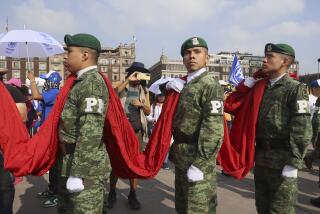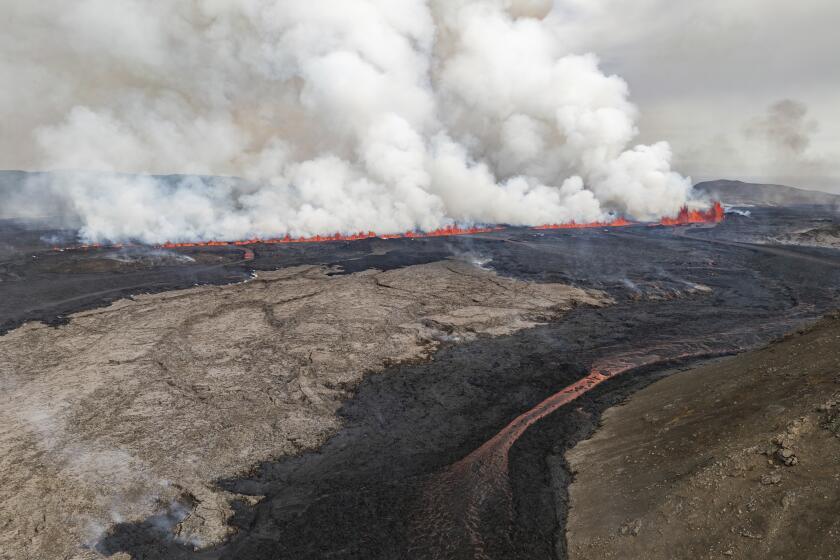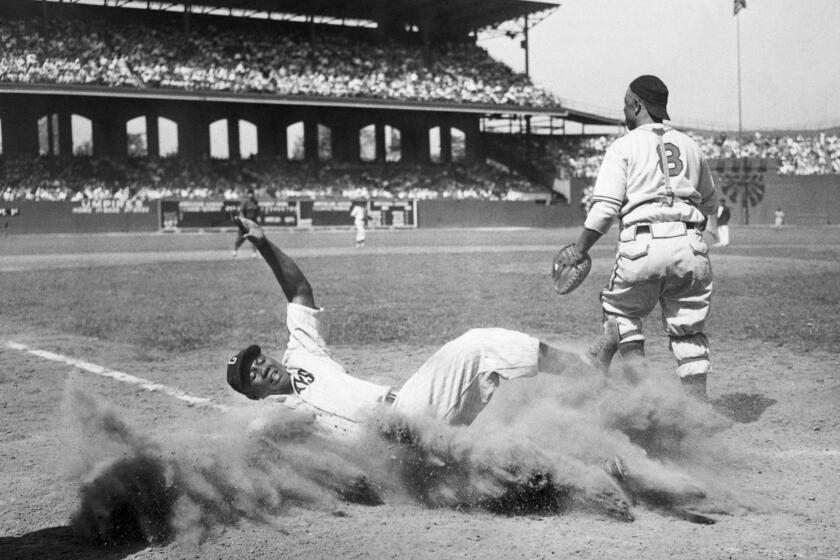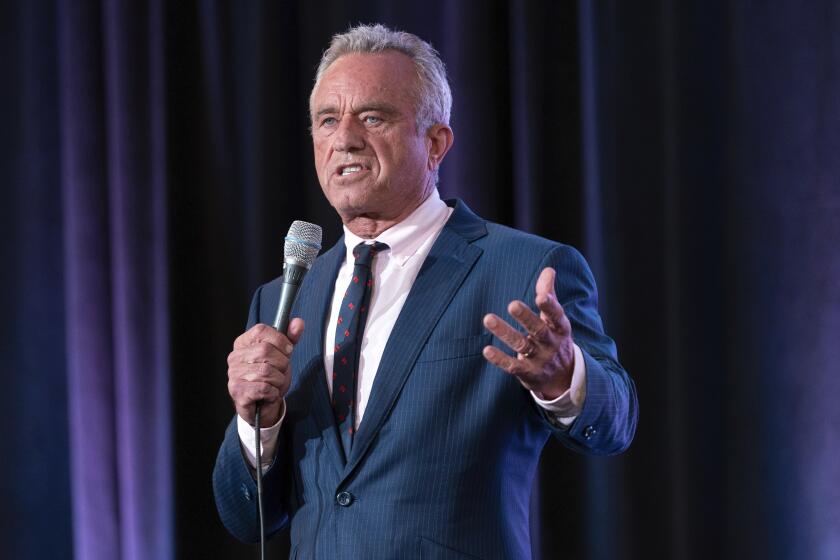Insurgent Attacks Kill 36 People in Iraq
Insurgents targeting Iraqi security forces Monday killed at least 36 people in four cities, including the Kurdish stronghold of Irbil, which a top government official had described only a day earlier as one of many stable areas of Iraq.
The deadliest attack took place in a dusty field behind Irbil’s traffic police headquarters, where a suicide car bomber killed 13 people and injured 100 during police officers’ morning workout. In a second attack elsewhere in Kurdistan, a suicide bomber killed a local security official and two of his guards as their convoy passed a cemetery.
Attacks have not been as frequent in the northern city of Irbil -- home to the parliament of Kurdistan, a largely autonomous region of Iraq -- as in other parts of the country. But in May, 60 people were killed outside a police recruitment center.
Othman Haji Mahmoud, interior minister of the Patriotic Union of Kurdistan administration in Sulaymaniya, about 90 miles southeast, said insurgents “want to convey a message, saying that they are here in Kurdistan and are threatening life like in the rest of Iraq.” To drive home that message, their attacks have to be spectacular, he said.
On Sunday, Iraqi Foreign Minister Hoshyar Zebari described this city as one of the country’s many stable areas. In recent days, U.S. and Iraqi officials have declared that massive raids on insurgents in Baghdad and west of the capital had been successful.
In the capital Monday, attacks began just before dawn when two car bombs targeted Iraqi special forces in the Rissala neighborhood, killing two people.
In what appeared to be a highly coordinated assault, about 30 insurgents tried to storm the Bayaa police station using mortar rounds, rocket-propelled grenades, a car bomb and small-arms fire. In a fierce gun battle with Iraqi commandos, police officers and American forces, 10 insurgents were killed and 20 captured, according to the U.S. military. Four Iraqi security officers were killed.
A few hours later, a roadside bomb near Al Mamoun High School killed four officers patrolling the capital’s upscale Mansour neighborhood.
In the afternoon, a car bomb exploded on the road to Baghdad airport, wounding three Iraqis near a checkpoint, officials said.
West of the capital, gunmen killed three members of the Kurdish peshmerga militia forces near the town of Hit, and the militant group Ansar al Sunna claimed to have killed seven people in a convoy near Ramadi, Associated Press reported.
More than 1,000 U.S. Marines are involved in two large offensives underway in the western province of Al Anbar. About 40,000 Iraqi troops are engaged in a similar operation in Baghdad. Officials say police and soldiers have arrested hundreds of suspected militants, recovered more than $6 million and killed 36 suspected insurgents during the operation, which began late last month.
Despite the crackdown in Baghdad, bombings and assassinations have killed hundreds of people in the last few weeks. Militants frequently target Iraqi recruits and security forces, but the victims often include scores of civilians, as happened Sunday when a suicide bomber killed 23 people in a downtown restaurant popular with police.
In Irbil, Jamal Osmah, 30, was among more than 200 recruits who were training behind the traffic police headquarters on the main road south to Kirkuk.
A little before 8 a.m., a red car came hurtling toward them. “Someone yelled, ‘Run away!’ ” said Osmah, recuperating in the Irbil hospital, his pants bloody from the attack.
Like many victims, Osmah was a new recruit with less than two weeks on the job. The force of the explosion flung him into the air, and he landed in the middle of carnage. “I saw friends killed, wounded, crying out, ‘Why, why?’ ” he said. “Blood everywhere.
“It’s not the first time they tried to kill us, but we’re not afraid,” he continued. “I’ll stay as a policeman and serve my country.”
Doctors rushed to the hospital to help colleagues treat the wounded. Female relatives of the victims crowded the hallways as nurses attended men on bloodied sheets.
“The first time we weren’t prepared for such an attack, so we were shocked,” said Lana Friyad, a doctor. “This time, we were prepared.”
Umed Edres, 23, regained consciousness as he was surrounded by friends and relatives. His eyes were bloodshot and bruised, his arm broken and his head cut.
“I don’t think the bloodshed will stop,” Edres said. “But we must be more careful.”
For Subhi Abdullah, Monday was his first day in uniform. The 25-year-old died in the explosion.
His wife, Wafa Sherzad, 20, stood in a small courtyard in front of the room she had shared with her husband. One of their three children, an infant son, was sleeping in a crib nearby.
“My heart! My husband!” she screamed as relatives tried to calm her. “My love, the father of my children!”
As he left that morning, he had jokingly told her that she should salute him when he returned. “Then he went to his children, who were sleeping, and he kissed them,” Sherzad said, her eyes swollen from crying. “Afterward, he went to his mother, kissed her and said: ‘Mother, I’m going. I can’t be late.’ He was so happy.”
After the explosion, investigators found the torso of the driver. He was tied to the steering wheel, officials said. The car was packed with pieces of metal to maximize the effect of the blast.
“We’re not soldiers, we’re traffic police,” said Dsuwar Mohammed, head of the Irbil traffic police.
“But maybe they came to us because we don’t carry guns.”
Investigators suspect that Ansar al Sunna was behind the attack, according to Farhad Karim Salim, the Irbil chief of police.
“Of course there’s someone inside Irbil helping them to find the place to attack, and to offer them beds for the night,” Salim said. Recently, security forces apprehended a large group of insurgents, including a high-ranking security official who was allegedly collaborating with the guerrillas.
The religious extremists of Ansar al Sunna, mostly Sunni Muslim Kurds, took responsibility for the May attack, calling it revenge for Kurdish collaboration with the Americans. The militant group seeks to destroy the two main secular Kurdish parties, both staunch U.S. allies since the early 1990s and supporters of the invasion that ousted Iraqi President Saddam Hussein.
Ansar al Islam, from which Ansar al Sunna is descended, was once based in the mountains of Kurdistan. But after U.S. bombings and pressure from Kurdish security forces, it began establishing a presence in cities such as Mosul and Kirkuk, carrying out assassinations, kidnappings and suicide attacks.
“To watch such a vast area you need a tremendous force,” Mustafa Sayed Qadir, deputy commander of the peshmerga general staff in Sulaymaniya, said after Monday’s attacks.
West of here in Tall Afar and Mosul, American troops routinely clash with insurgents. During various operations Monday, U.S. and Iraqi troops killed four suspected insurgents, detained 18 and rescued a kidnapped civilian.
Capt. Amjad Hashim of the Tall Afar police said security in that city had deteriorated in the last two months. “Insurgents are trying to create sectarian clashes between Sunnis and Shiites living here and are targeting both sides,” he said.
When Mosul became unstable in the fall of 2004, Tall Afar also became vulnerable to insurgents. U.S. troops entered the area but were unable to apprehend the guerrillas, Hashim said.
Shops in the city have closed because of the insecurity, depriving some families of food, he said.
Meanwhile in Baghdad, as temperatures soared above 100 degrees, more than 2 million residents were without water for the second day in a row after insurgents sabotaged a main water pipeline Sunday. Since the attack, the price of bottled water has almost doubled.
Ahmed Hameed, a former Iraqi army officer, 32, said many people had begun using water from the Tigris River. “I took a shower this morning by this unpurified water,” he said. “It takes a long time to purify the water, so we mainly do that for cooking and drinking.”
*
Special correspondents Asmaa Waguih in Baghdad, Azad Seddiq in Sulaymaniya and Abdul Salam Medine in Irbil contributed to this report.
More to Read
Start your day right
Sign up for Essential California for news, features and recommendations from the L.A. Times and beyond in your inbox six days a week.
You may occasionally receive promotional content from the Los Angeles Times.






